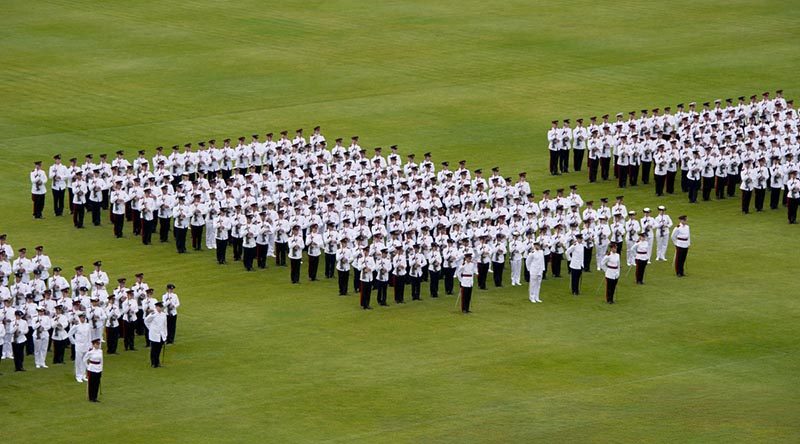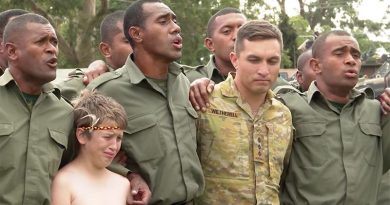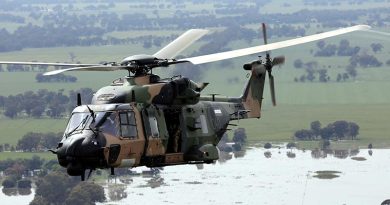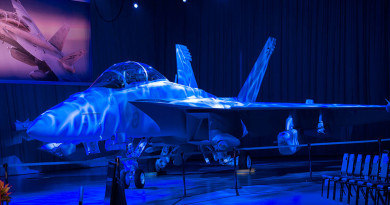Use and abuse of gender-neutral language

From time to time, CONTACT receives statements from Defence seeking to ‘correct the record’ after a journalist reported something Defence didn’t like.
FILE PHOTO (2014): Australian Defence Force Academy midshipmen and officer cadets on parade at ADFA. Photo by Leading Seaman Justin Brown.
Since I don’t buy newspapers and can’t read stories that are protected by paywalls, these Defence statements often constitute an out-of-context one-sided argument for me – so I generally ignore them.
So it was this morning when I received a Defence communique titled “Statement regarding the use of gender-neutral language”.
I read it, raised an eyebrow – then filed it – no further action.
But then I went to the gym and met some good-old-boyz for coffee afterwards, where one of many topics that came up was “that shit about gender-neutral language“.
Later, in a supermarket, I saw the newspaper with the front-page headline ARMY DROPS THE ‘H’ BOMB. Front-page EXCLUSIVE no less.
So I bought my first newspaper in about 40 years, for ‘research’.
And here are my thoughts…
Defence’s opening statement – “Reports regarding Defence requiring the use of gender-neutral language are wrong” – is only partially true. It is true that ‘Defence’ does not require the use of gender-neutral language (at least not yet)(and only if you don’t count ADFA as part of Defence) – but the report in the newspaper isn’t actually wrong either in so far as the quoted document and the quoted use of gender-neutral language does actually exist – at ADFA – as stated in the story.
Defence also said – “As was explained to the journalist prior to publishing, the Department has not, and is not intending, to issue a directive on the use of gender-neutral language.” And, in fact, the story in the newspaper quotes a Defence spokesman as saying exactly that. So, in that regard, the newspaper story is actually balanced and fair and accurate (unlike the Defence statement) – and not an error of omission (as Defence was suggesting). Yet, the Defence line isn’t actually wrong either – but only in so far as the document (that does actually exist) was not a ‘directive’ (in Defence parlance).
Defence said – “ADFA Cadets are not being told that they should not use terms like him or her” – and, as I understand it, this is true too – but only in so far as the ‘guidance’ on this issue (which does exist) was a guidance for ADFA staff, not cadets.
After that, the Defence statement continues with 103 more words (see statement in full below) which are true – but largely irrelevant to the actual substance of the newspaper report.
At no time in the entire statement did Defence seek to deny the existence of the document at the heart of the story.
However, from a reporting point of view, in my opinion, the journalists left themselves wide open to being contradicted by failing to get basic ‘facts’ right.
For example, while the document they quoted from does actually exist and does actually say what they said it says, calling it a ‘directive’ allows Defence to rebut “has not, and is not intending, to issue a directive“.
Then there’s the use of the words ‘Army’ and ‘soldiers’ throughout the story. But, the document in question was circulated within ADFA only – a civilian-run tri-service college where no students and only some staff are ‘soldiers’ – so Defence can easily and truthfully say “Cadets are not being told…”.
The bottom line is – there is a document in existence that says, in essence, what the newspaper story reported – and the Defence statement, while attacking nuances of the story as written, made no attempt to actually deny the existence of said document or its contents.
THE DEFENCE STATEMENT IN FULL
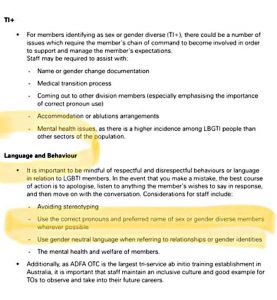
Reports regarding Defence requiring the use of gender-neutral language are wrong. ADFA Cadets are not being told that they should not use terms like him or her. As was explained to the journalist prior to publishing, the Department has not, and is not intending, to issue a directive on the use of gender-neutral language. For example, every day ADFA cadets address their seniors as Sir and Ma’am. This has not, and is not, changing. There are around 80,000 personnel in the Australian Defence Force. Supervisors and commanders are required to lead teams from all walks of life, who often work, eat and sleep in close proximity for extended periods. Commanders must be skilled in harnessing these diverse backgrounds and experiences in their teams to deliver what is required. Effective teamwork is at the centre of ADF capability and it is built on respect and cohesion. Members of the Australian Defence Force are required to work with each other, and address each other, in a respectful manner. This includes members addressing each other by rank and using the customary military compliments.
.
.
.
.
.
.

.
.

